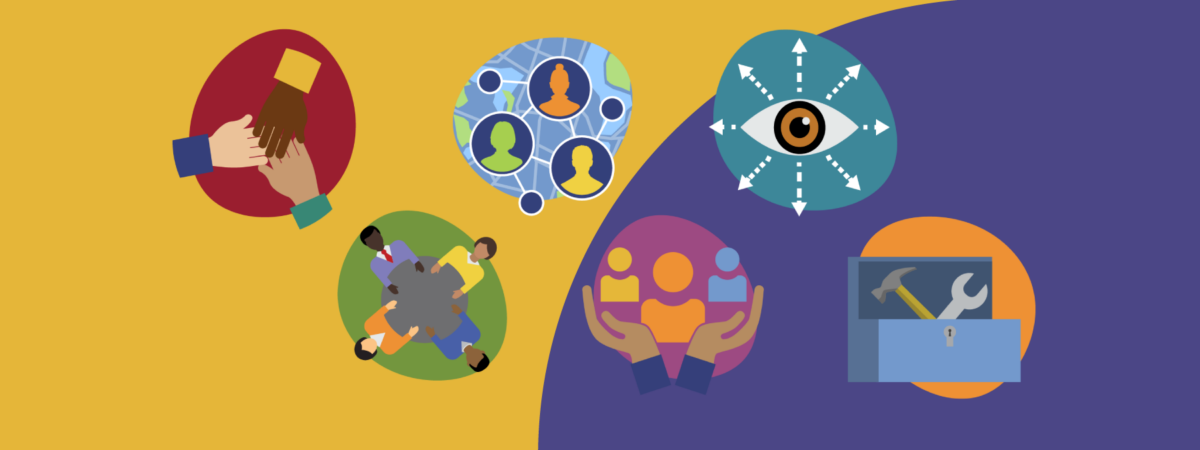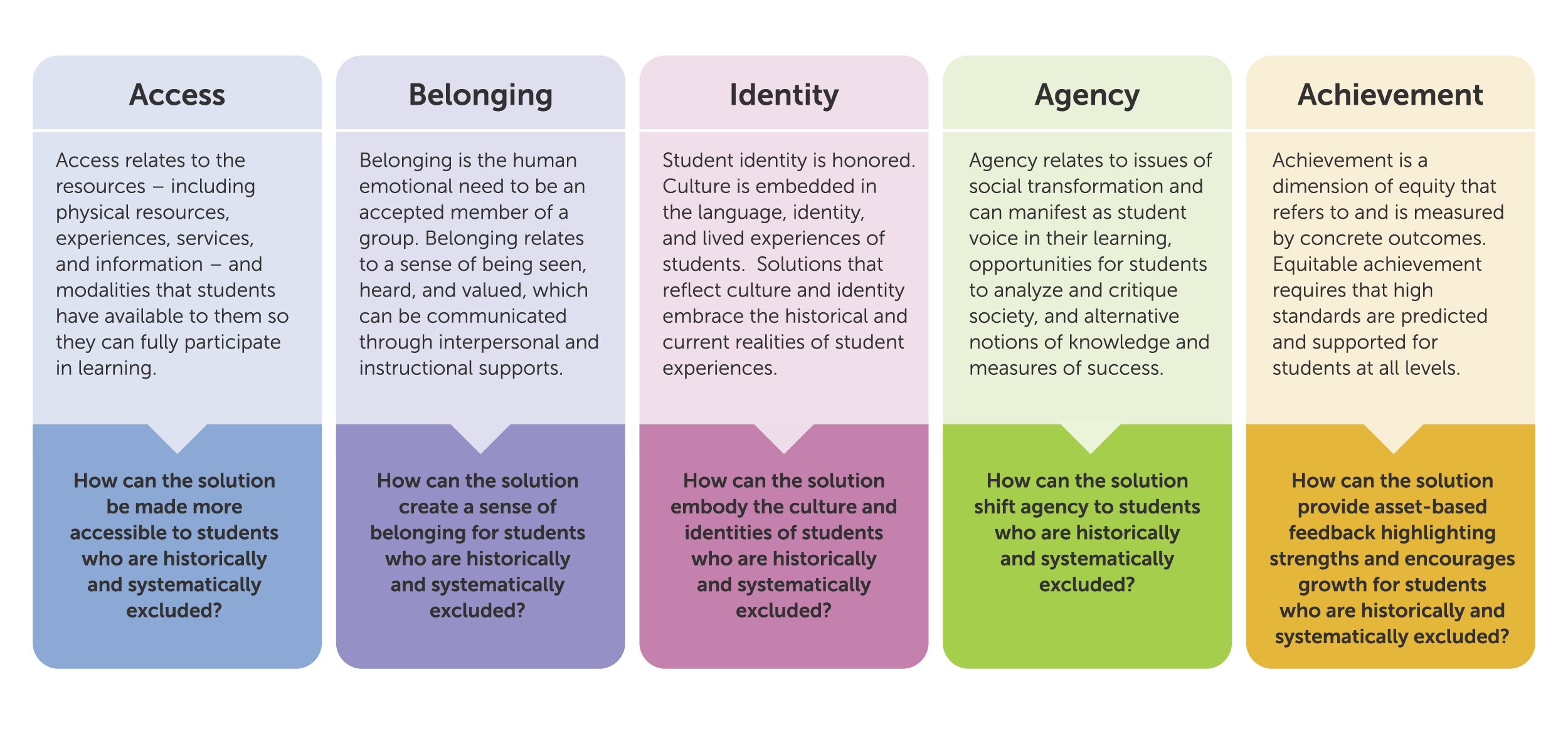
Each of our research and development (R&D) projects is anchored in the six core tenets of Inclusive Innovation. The core tenets are made up of four Practice Tenets that guide the day-to-day engagement of education R&D and two Impact Tenets that guide the outcomes. When used together, these six core tenets provide a solid foundation for some of the most inspiring school and community-based innovation to emerge.
As Baron R. Davis, senior advisor to Digital Promise, said, “We want to do things with people, not for them, or to them.” Continue reading to learn more about each of the core tenets and hear reflections from CII staff on how they power our work.
Through Collective Ownership, we shift the R&D process to a model of co-leadership, co-research, and co-design with those most impacted under a particular challenge—students, parents, and communities.
Chief Inclusive Innovation Researcher Viki Young said it has been both “humbling and powerful” to implement a model that embeds co-research with those most impacted by barriers in schools.
“In stepping back to center those whose lived experience is the relevant expertise, my mindset as a researcher has profoundly shifted,” Young said. “Accurately framing a problem and authentically understanding its root causes can only be done through mutual partnership and co-leadership with those experiencing the challenge.”
Jenny Bradbury, senior director of solutions strategy and innovation, uplifted a recent collaboration between the Center for Inclusive Innovation, LitLab.ai, and LeanLab on an AI-powered early literacy tool that was greatly improved by the input of teachers and students. She shared that the teams modeled transparency and accountability in co-design, which resulted in a mutually beneficial partnership and a much stronger edtech product.
“The relationships established were so positive that even though the study has officially ended, teachers are still sending ideas and feedback to the R&D team,” Bradbury said.
In Inclusive Innovation, young people are elevated as experts and their voices are centered in co-creating their learning experiences. In order for this to work, a mindset shift toward the belief that students can and should lead education R&D is absolutely necessary.
One of the best examples of this core tenet in action is the League of Innovative Students (LOIS). Each cohort of young innovators participates in a design sprint where they lead the development—and sometimes even implementation—of solutions and products that impact the national education landscape. As Cassie Graves, program manager for the Center for Inclusive Innovation, shared, “At the heart of LOIS is a profound belief in the power of student voice and leadership.”
“By fostering an environment that values the unique perspectives of youth, LOIS empowers students to become leaders in schools’ and districts’ discussions surrounding educational equity and social justice, and designers of the systems and structure of education itself,” she said.
Individuals with context expertise have first-hand understanding of student/community needs and experience with the impact of inequities. Through this core tenet of Inclusive Innovation, we honor traditional content experts (e.g. academic researchers, technical developers) and context expertise on an equal plane.
Hillary Greene Nolan, an education researcher at CII, is a former teacher and recalled wishing she had a way to share everyday discoveries, questions, and observations about her work from having firsthand experience with the challenges educators face. Now, as a researcher, Hillary said she’s distanced from the context of what life is like in the classroom.
“Working with the people who are experiencing the palpable of the day-to-day is essential to me as a researcher—it keeps me close to teaching and the struggles of teaching and it reminds me why I left teaching for research,” Greene Nolan said. “I believe in listening to teachers and amplifying their ideas.”
A big part of project director Zareen Kasad’s work at CII is conducting listening tours in different school districts across the country and hosting various focus groups with students, educators, parents, caregivers, and community members. She said the tours have been a powerful way to emphasize context expertise and learn firsthand how important it is to center the perspectives of those closest in proximity to an educational challenge in order to better understand the complexities.
“When members of a school community are given the opportunity to share their stories and lived experiences, it becomes easier for them to identify and offer viable solutions to tough challenges like student engagement,” she said.

A group photo from the second annual convening of Teaching Is My Favorite Color, a network that was created out of a three-district Inclusive Innovation collaboration to recruit and retain teachers of color in Pennsylvania.
Continuity of Commitment, the last of the four Practice Tenets, focuses on building the relationships and trust that ensures students, families and communities continue to be centered in the education R&D process.
As the CII team shaped and deepened the Inclusive Innovation process, Young said she gained a holistic view of where and how equity needs to be incorporated—a skill that can be developed and put into practice. Knowing how to effectively apply and facilitate R&D work with a lens of equity is “indeed a domain of expertise,” she said.
For Bradbury, this is the tenet that she feels she has contributed to the most by developing a number of tools to track continuous improvement and progress, making sure equity remains centered in the R&D process.
“I’ve learned a lot over the last few years about how easy it is to lose sight of their equity commitments when getting into the work, so these types of tools and conversations are critical,” she said.
When addressing important educational challenges, the outcomes and measures of success defined by communities sometimes differ from traditional outcomes and measures. With this core tenet, Inclusive Innovation holds that students thrive when success is measured across multiple dimensions—achievement, access, belonging, identity and agency in their own learning.
“In a rapidly changing world, I believe that shifting the conditions of education systems so students from historically and systematically excluded communities have well-being and agency to define, pursue, and realize their aspirations is the key challenge we must meet in education innovation,” Young said.

The dimensions of Inclusive Innovation tool developed by Digital Promise and informed by Rochelle Gutiérrez’s Dimensions of Equity model.
The final core tenet speaks to our commitment to build capacity with schools and communities so they have the resources, mindsets, and skills to build and sustain capacity for education R&D into their everyday work and the future to transform education.
Kristian Lenderman, project director for CII, shared that in the Cybersecurity Pathways Initiative, district teams were provided facilitation materials and infrastructure/coaching support to build an engaged core team that co-designs recruitment events, dual credit opportunities, and mentorship programs. In doing so, they built capacity for district leaders and staff to continue collaborating with community, students, teachers, and industry partners in building pathways into the cybersecurity field.
Lenderman uplifted a testimonial from a district administrator who said: